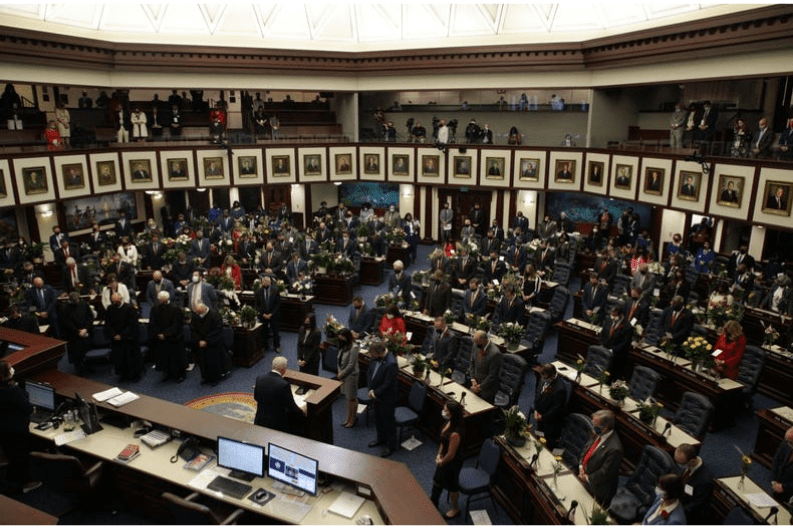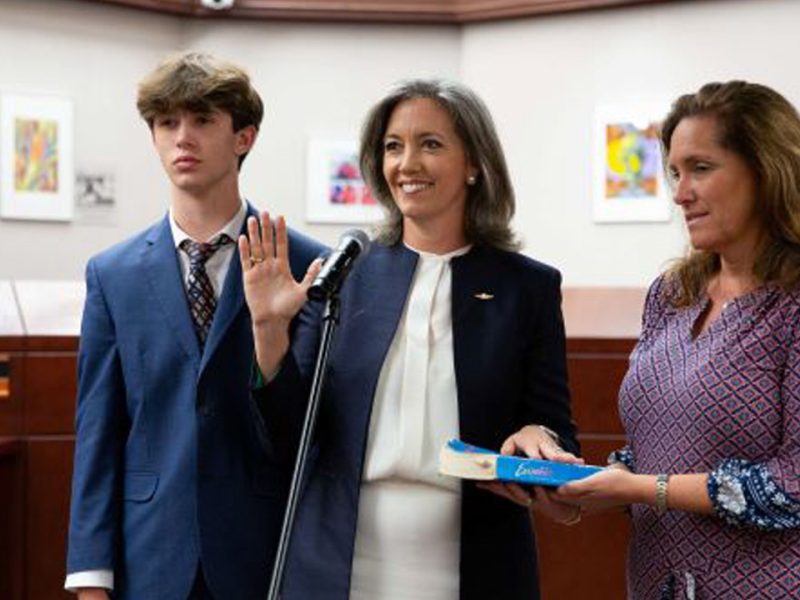Bonus money, pay raises and projects tucked in as state budget set
The Palm Beach Post | by John Kennedy, Capital Bureau USA TODAY NETWORK-FLORIDA | April 27, 2021
TALLAHASSEE – Bonus payments of $1,000 will go to teachers, principals, first responders and correctional officers in Florida as part of a roughly $100 billion state budget finalized Tuesday and powered by $6.6 billion in federal COVID-19 recovery cash.
The move sets the Legislature on course to finish the two-month session by its scheduled deadline, Friday.
Among the late agreements between House and Senate negotiators is a decision to set a $13 minimum wage for all state workers, a $43 million item promoted by Senate President Wilton Simpson, R-Trilby, in advance of statewide minimum wage increases approved by voters last fall.
Even Gov. Ron DeSantis got in on the pay hikes. He was given $1.2 million to make “salary adjustments” for his agency heads in one of the last-minute deals made by lawmakers.

The Republican governor and GOP-controlled Legislature were helped by the American Rescue Plan advanced by President Biden and the Democratic-led Congress, which steered $10.2 billion to state government and erased what had earlier been expected to be a lousy budget year certain to include deep program cuts.
Every Republican member of Congress voted against the Rescue Plan. But DeSantis and Florida Republicans have used it to craft what is certain to weigh in as the biggest budget in state history.
The budget was delivered to lawmakers at 12:06 p.m. Tuesday, starting the clock on a constitutionally required 72-hour waiting period before a final vote can be taken.
Lawmakers could button-up the 2021 regular session well before nightfall Friday – with a special session planned to start May 17 on DeSantis’ proposed gambling compact with the Seminole Tribe of Florida.
Working into the night Monday, Senate budget chief Kelli Stargel, R-Lakeland, and House counterpart Rep. Jay Trumbull, R-Panama City, signed off on scores of individual spending provisions, including almost 200 late additions topping $250 million – mostly hometown programs and projects sought by individual lawmakers.
Another roughly $80 million worth of city and county water and sewer projects also were approved – late.
“We fully funded things, which wasn’t our expectation when we started this year,” Stargel acknowledged.
The bonus payments likely won’t be coming to Floridians until after the budget takes effect, July 1. The state’s Department of Economic Opportunity is being tasked with working with state agencies and local governments to make the payments.
Stargel also defended the move by budget-writers to tuck almost half the $10.2 billion from the federal government into reserves – a point of conflict with outnumbered Democrats in the Legislature who argued that putting the money into reserves and public works projects broke with Biden’s focus on bringing relief to working families hurt by the pandemic.
“We have a lot of money that’s been left on the table to plan for the future, knowing that we have a lot of challenges ahead of us,” Stargel said.
But Republican budget negotiators did comply with some Democratic demands – expanding state funding for the Agency for Persons with Disabilities by $80 million, removing hundreds of people more from waiting lists that in initial budget proposals were going to be pared by only 300 critically needy Floridians.
Similarly, the state’s community care for the elderly program, whose waiting list stretches to almost 50,000 Floridians, was given a late $5 million budget addition. Cultural grants also received $4 million more – an expansion that had been pushed by Rep. Carlos Guillermo Smith, D-Orlando.
“Pressure works – sometimes,” Smith said.
A host of big-ticket projects were financed with the money from Washington. Efforts to clear the Piney Point reservoir in Manatee County, fouled by phosphate mining, drew $100 million; septic-to-sewer conversions and grants to cities dealing with rising sea level got another $1 billion; and state transportation work would receive $2 billion of spending.
“With the American Rescue Plan, we’re really investing in Florida’s future, from a water quality standpoint,” Trumbull said.
Along with the $1,000 bonus payments, some teachers could benefit from $550 million put into the budget, part of a second year in an effort to bring minimum teacher salaries up to $47,500.
But classrooms will see a generally modest increase of just under $39 per student, bringing funding to an average $7,795 for the state’s almost 2.9 million school children – among the lowest boosts in recent years.
Schools next year are likely to see in-person attendance rise as pandemic concerns ease, and lawmakers also have set aside $464.3 million as a reserve districts can tap for enrollment increases and financing a major expansion of students eligible for private school vouchers.
“It is an increase, but while we do that, we also increase teacher salaries and give teachers a one-time bonus,” Trumbull said.






